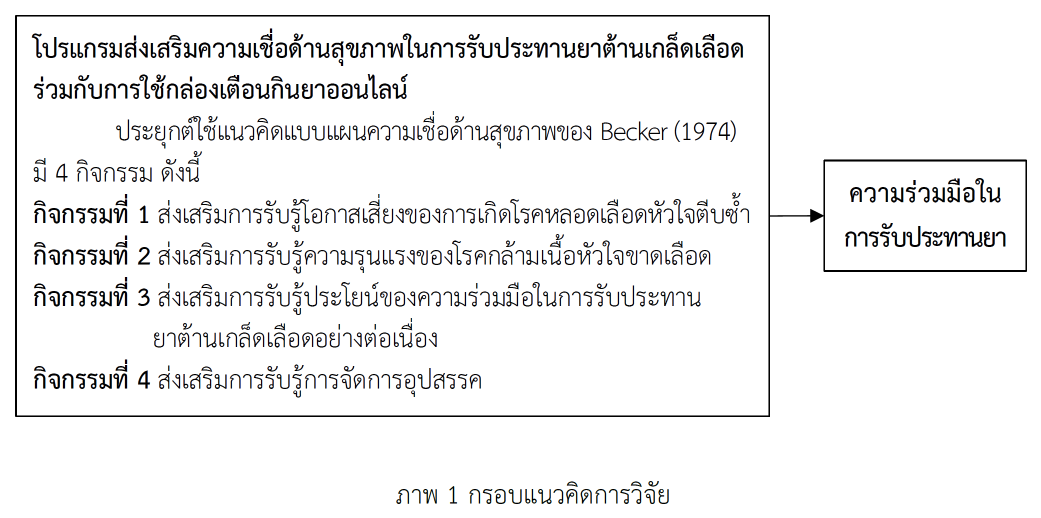THE EFFECTS OF A HEALTH-BELIEF-PROMOTING PROGRAM FOR ANTIPLATELET MEDICATION COMBINED WITH ONLINE PILLBOX REMINDER ON MEDICATION ADHERENCE AMONG PATIENTS WITH MYOCARDIAL INFARCTION UNDERGOING PERCUTANEOUS CORONARY INTERVENTION
Keywords:
medication adherence, health-belief model, antiplatelet medication, myocardial infarction, percutaneous coronary interventionAbstract
This quasi-experimental research aimed to study the effects of a health-belief-promoting program for antiplatelet medication combined with online pillbox reminders on medication adherence among patients with myocardial infarction undergoing percutaneous coronary intervention by applying the health-belief model as a conceptual framework. The sample consisted of 46 patients with myocardial infarction, aged 18 years and above, undergoing percutaneous coronary intervention at the intensive medical care unit of a tertiary hospital in Bangkok. The sample was divided into 23 persons in an experimental group receiving the health-belief-promoting program for antiplatelet medication combined with online pillbox reminders, and 23 persons in a control group receiving a regular program. The instruments in this study were the health-belief-promoting program for antiplatelet medication combined with online pillbox reminders and a medication adherence assessment. The content validity index (CVI) of the assessment equaled .94, and its Cronbach’s alpha coefficient was .96. The data were analyzed using descriptive statistics. The differences between the experimental group and the control group were compared using analysis of covariance (ANCOVA) and pairwise comparison by the Bonferroni method.
The research results indicated that medication adherence among the experimental group after receiving the health-belief-promoting program for antiplatelet medication, together with the use of online pill box reminders, was statistically significantly higher than before receiving the program at .05 (M = 87.39, SD = .94, and M = 51.52, SD = 3.79, respectively; t = 44.069, p = .001) as well as the control group who received regular nursing care (M = 87.39, SD = .94, and M = 51.17, SD = 2.86, respectively; t = 53.729, p = .001). It can be concluded that the health-belief-promoting program for antiplatelet medication combined with online pillbox reminders could encourage patients to have better medication adherence. Healthcare teams are able to use this program to promote medication adherence among other groups of patients accordingly.
Downloads
References
Ardehali, A., Chen, J. M., & Khonsari, S. (2017). Khonsari's cardiac surgery: Safeguards and pitfalls in operative technique. China: Wolters Kluwer.
Becker, M. H. (1974). The health belief model and personal health behavior. Health education monographs, 2, 324-473.
Boonkua, C., Wattanakitkrileart, D., Sriprasong, S., & Dumavibhat, C. (2022). Factors predicting adherence to dual antiplatelet medications among patients with acute coronary syndrome after percutaneous coronary Intervention. Nursing Science Journal of Thailand, 40(3), 60-75.
Chuaytaen, T., & Ua-Kit, N. (2016). The effect of promoting perceived benefits and perceived barriers program on medication adherence of myocardial infarction patients who underwent percutaneous coronary intervention. Songklanagarind Journal of Nursing, 36(3), 56-76.
Department of Disease Control. (2020). Knowing about diseases and health threats: Sor Kor 6, Chonburi invites you to protect your heart on World Heart Day. Retrieved from https://www.ddc.moph.go.th/odpc6/news.php?news=14902&deptcode=odpc6&news_views=265
Griffiths, J., Puttinoi, S., & Pongsaksri, M. (2014). The general practitioner assessment of cognition; GPCOG (Thai version): Validity and reliability. Poster session presented at 9th Pan-Pacific Conference on Rehabilitation cum, 21st Annual Congress of Gerontology, Hong Kong. Retrieved from http://www.gpcog.com.au/uploads/ckfinder/userfiles/files/20160606_Thai_GOCOG%20Update%20 Jiranan%20 Griffiths.pdf
Kang, H. (2021). Sample size determination and power analysis using the G*Power software. Journal of Educational Evaluation for Health Professions, 18(1), 17-28. http://doi.org/10.3352/jeehp.2021.18.17
Kronish, I. M., & Ye, S. (2013). Adherence to cardiovascular medications: Lessons learned and future directions. Progress in cardiovascular diseases, 55(6), 590-600. Retrieved from https://www.ncbi.nlm.nih.gov›articles
Kumpiriyapong, N., & Sasat, S. (2017). The effect of health belief programme on medicine used behavior in older persons with hypertension. Royal Thai Navy Medical Journal, 44(3), 67-83.
Orem, D. E. (1985). Nursing: concepts of practice (3rd ed.). New York, NY: McGraw-hill.
Pattanajak, C. (2019). Medication adherence in elderly patients with chronic disease at Lad Pattana health promoting hospital, Muang district, Mahasarakham province. Mahasarakham Hospital Journal, 16(3), 13-22.
Penpimo, P. (2016). The influence of perceived medication necessity, medication concern, patient-healthcare provider communication, and complexity of medical regimens on medication adherence in patients with acute coronary syndrome after hospitalization. Journal of The Royal Thai Army Nurses, 17(3), 149-157.
Ritruangsak, S. (2016). Self-care for medication use in adults with coronary artery disease. Thai Journal of Cardio-Thoracic Nursing, 27(1), 85-97.
Rungsawang, S. (2015). Factors related to polypharmacy medication adherence among older persons with chronic illness. Journal of Nursing, Siam University, 18(35), 6-23.
Seesanea, S., & Wattanakitkrileart, D. (2018). The effect of mobile application on medication adherence in patients with acute coronary syndrome after hospitalization. Nursing Journal of The Ministry of Public Health, 28(1), 61-74.
Seetisan, P., Suwannarat, A., & Jailungkar, J. (2013). Factors associated with self-care behaviors among uncontrolled hypertension patients in Dokkhamtai hospital, Dokkhamtai district, Phayao province. Lanna Public Health Journal, 9(2), 120-136.
Surasrisakul, I., & Ua-Kit, N. (2012). Predicting factors of medication adherence among myocardial infarction patients after underwent percutaneous coronary intervention. Journal of The Police Nurses, 4(2), 60-70.
Tipaksorn, P. (2022). A cloud-based AIoT application in smart building. RMUTL Engineering Journal, 7(1), 52-61.
Valgimigli, M., Bueno, H., Byrne, R. A., Collet, J. P., Costa, F., Jeppsson, A., . . . ESC Scientific Document Group. (2018). 2017 ESC focused update on dual antiplatelet therapy in coronary artery disease developed in collaboration with EACTS. European Journal of Cardio-Thoracic Surgery: Official Journal of the European Association for Cardio-thoracic Surgery, 53(1), 34–78. https://doi.org/10.1093/ejcts/ezx334

Downloads
Published
How to Cite
Issue
Section
License
Copyright (c) 2023 JOURNAL OF THE POLICE NURSES

This work is licensed under a Creative Commons Attribution-NonCommercial-NoDerivatives 4.0 International License.
ผลงานที่ได้ตีพิมพ์แล้วจะเป็นลิขสิทธิ์ของวารสารพยาบาลตำรวจ














